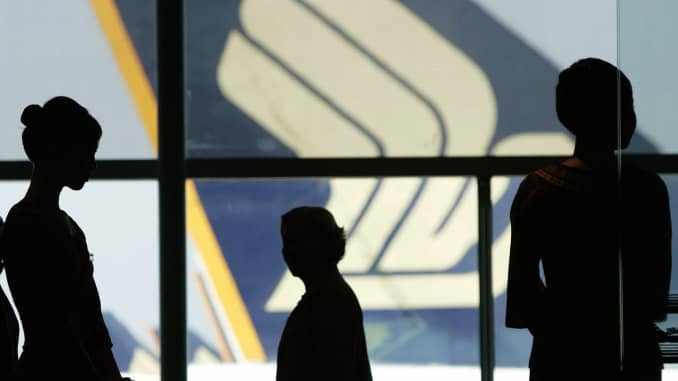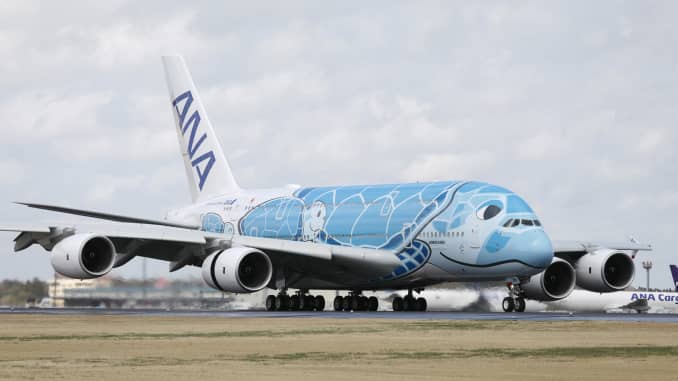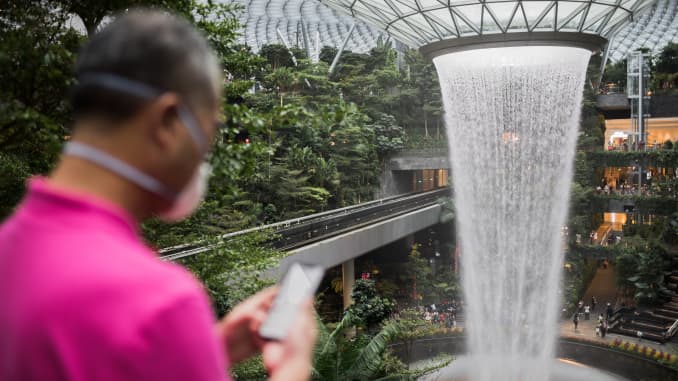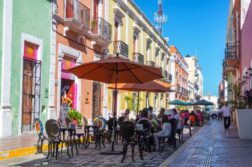Singapore Airlines is said to be considering a new route next month — what media reports are calling a “flight to nowhere.”
Flights that take off and land from the same place — in this case, Singapore Changi Airport — may start as early as next month, according to a report in the local Straits Times and elsewhere.
Singapore Airlines has not confirmed the flights and told CNBC that “none of these plans have been firmed up.” But if it does debut destination-free flying, it will not be the only carrier in Asia that’s doing it.
No official announcement
Such flights could be seen as a way to help the embattled national carrier of Singapore cope during a year of record losses caused by the Covid-19 pandemic, reports claim, while also allowing residents of the small nation a chance to leave the island — if only for a few hours.
Singapore Airlines, which is routinely ranked among the world’s best, has been hit hard by the global pandemic, since it does not operate domestic flights.

Singapore Airlines told CNBC that it’s considering “several initiatives” to engage the public.
“We will make an announcement at the appropriate time if we go ahead with these initiatives,” a Singapore Airline spokesperson told CNBC’s Global Traveler.
A cooped-up nation
Most of Singapore’s 5.7 million residents have been unable to travel since Singapore shut its borders in late March.
Australian Leithen Francis, who has lived in Singapore since 2001, is interested in the no-destination flights should they become a reality.
“I think it’s a great idea and would be willing to go if [Singapore Airlines] goes ahead with the idea,” he said. “Singapore is an island, and I am used to traveling so [I] definitely miss flying.”
It “would also be good to experience the … business lounge at Changi too,” he said.
Singaporean Suzanna Low said she would pay for a ticket “if the amount is reasonable.”
“I would pay … mainly because I miss traveling … [and]the whole process of checking in, the airplane food and of course [flight attendants’]warmth and smiles,” she said in a message to CNBC’s Global Traveler.
One idea: Start a staycation with a flight
Stefan Wood, managing director of Singapore Air Charter, a private jet service, told CNBC’s Global Traveler that he pitched the idea of a single flight to Singapore Airlines months ago. The idea evolved, he said, into a series of flights over 25 weeks that supported local businesses by providing local craft beer, limo transfers and luxury hotel stays to passengers too.

In the end, the airline decided to take on the venture by itself, Wood said. Singapore Airlines declined CNBC’s request for comment on the pitch Wood described.
Wood said he is still pursuing the idea of starting a staycation with a flight, though he is looking into using corporate jets rather than commercial flights.
“The idea certainly wasn’t a flight to nowhere — it was a flight to Singapore,” Wood said. “People pay for staycations, so the idea was to start one with a flight.”
A trend in other parts of Asia
If Singapore Airlines launches destination-free flights, it wouldn’t be the first Asia-based airline to do so. Media reports have buzzed about what they call “flights to nowhere.”
In late August, Japanese carrier All Nippon Airways flew a 90-minute scenic flight on one its “Flying Honu” Airbus A380 aircraft. Passengers were treated to a Hawaiian resort-style experience in the airport and onboard the plane, which normally flies between Tokyo and Honolulu.

Taiwanese air carrier Eva Air launched a sightseeing flight last month on one of its Hello Kitty jets. Departing from and landing at Taipei’s Taoyuan International Airport, the 2-hour 45-minute flight traveled at an altitude of 20,000 to 25,000 feet to give passengers a closer view of Taiwan and Japan’s Ryukyu Islands.
Taiwan’s national carrier, China Airlines, flew two flights that took off and landed in Taipei in August. A representative for China Airlines told CNBC that the initiative has received a positive response from the local market.
Royal Brunei Airlines launched a no-destination flight last month. The national flag carrier for Brunei, a Southeast Asian country on the island of Borneo, flew an 85-minute “Dine & Fly” sightseeing tour along the coastline of Brunei and Malaysian Borneo. The flight, which included brunch and pilot commentary, sold out within 48 hours, and hundreds have registered interest for future flights.
Why and where it works
Though a flight for the thrill of flying isn’t for everyone, no-destination flights may thrive in locations that have low Covid-19 infection rates and limited travel opportunities otherwise.
Singapore has reported 57,454 cases to date, most of them among its migrant worker community, who live largely in dormitories. The number of new cases excluding people in dormitories and incoming travelers has steadily decreased from an average of two cases per day two weeks ago to one case per day last week.

Singaporean family physician and self-described “aviation fan” Lee Kai Lun said he currently feels more comfortable flying with other passengers from Singapore rather than taking an international flight.
“No doubt the risk is not zero, but I would say it is still pretty low,” he said. “After being grounded for so long … I am itching to fly again.”
Japan has recorded 75,657 cases of Covid-19, while Taiwan has had 499 cases. With a population of around 440,000 people, Brunei has recorded only 145 cases to date.



